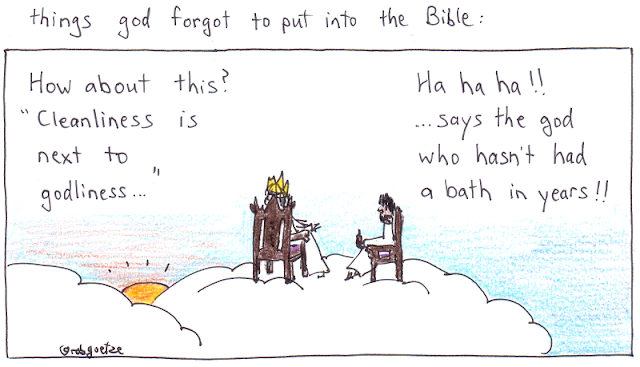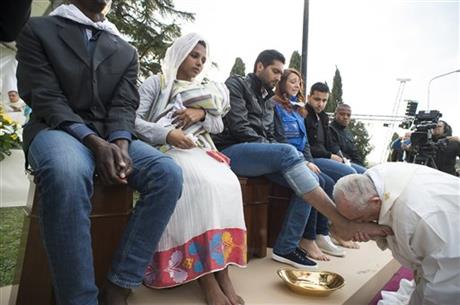If the Apostle Paul was like us... would Gentiles be part of the church?
Wednesday, June 01, 2016
Thursday, May 12, 2016
things god forgot to put into the Bible (#5)
Would it have changed much if God had put that verse in the Bible? Would the world be a better place? Would we no longer have a history of centuries of cultural genocide of indigenous peoples, of colonization, of white supremacy?
I mean, Jesus himself said things like:
“You have heard that it was said, ‘Love your neighbor and hate your enemy.’ But I tell you, love your enemies and pray for those who persecute you, that you may be children of your Father in heaven. He causes his sun to rise on the evil and the good, and sends rain on the righteous and the unrighteous. If you love those who love you, what reward will you get? Are not even the tax collectors doing that? And if you greet only your own people, what are you doing more than others? Do not even pagans do that? Be perfect, therefore, as your heavenly Father is perfect.and yet look at the world around us and what people who call themselves Christians are saying and doing...
(Matthew 5:43 - 48, NIV)
categories:
bullying,
colonialism,
racism,
things god forgot,
violence
Tuesday, May 10, 2016
[trouble i've seen, by drew g.i. hart]
Just got Trouble I've Seen: Changing the way the church views racism for my birthday. Pretty amazing book and very readable.
"In this provocative book, theologian and blogger Drew G. I. Hart places police brutality, mass incarceration, antiblack stereotypes, poverty, and everyday acts of racism within the larger framework of white supremacy. Leading readers toward Jesus, Hart offers concrete practices for churches that seek solidarity with the oppressed and are committed to racial justice.
What if all Christians listened to the stories of those on the racialized margins? How might the church be changed by the trouble they've seen?"
(source: herald press)
Here's a key thought from chapter one:
I suggest directly and indirectly throughout this book that our very intuitions cannot be shaped in hierarchy and dominance, as were the postures of Caesar, Herod, and Pilate. Instead, we must come alongside the crucified of the world in solidarity, as Jesus himself did, so that we can have our minds renewed. Dominant cultural intuitions run contrary to Christ's way of knowing. The one taking on the form of Christ in the world does not take for granted the popular or dominant view of things. Rather, the person committed to Jesus follows him to the margins and cracks of society, entering into what I call "counterintuitive solidarity" with the oppressed.Read more about this book, including praise, a sample chapter, and a free study guide at the publisher's webpage.
(pages 28-29)
Thursday, May 05, 2016
Monday, May 02, 2016
[we all believe in you]
A community for those struggling with mental illness developed by survivors of mental illness because... we all believe in you.
"We All Believe in You is a rapidly growing movement developed to de-stigmatize and de-mistify mental illness. WABIY serves to put a face to a typically faceless struggle as many live in the shame and anonymity of their disease. It is the goal of WABIY to use art, honesty, education, and community to abolish pre-existing ideas and beliefs about mental illness. And above all, for those that are struggling with mental illness to know that they are not alone and We All Believe in You."Featured on:
(from the WABIY website)
CTV News
http://www.weallbelieveinyou.com/
categories:
mental health,
portraits
Friday, April 29, 2016
things god forgot to put in the Bible (#3)
(inspired by a comment made by a nine-year-old)
Loading dishwashers is one of those things in life. There are people who load them willy-nilly and there are the people who load them the right way.
Of course, my right way of loading a dishwasher is not the same as your "right way" of loading the dishwasher. In fact, your way of loading the dishwasher is barely acceptable. And then there's my colleague who does an absolutely abominable job of loading the dishwasher in the staff kitchen!
And people wonder why I'm stressed out at work. Imagine how God feels when he sees all of this!
On a more serious note, have you ever heard anyone say, "God loves straight people but not what they do..."?
Wednesday, April 27, 2016
guess...
I sent an email to a pastor a few months ago, asking if lgbtq+people are welcome in their church and got an amazing reply, which I read during my break at work.
Later that evening while doing housework, I was thinking further about the reply and realized that I couldn't remember if the pastor had indicated what they believe about same-sex marriage.
That rather puzzled me. When I later checked the email, it turns out they had made one off-hand remark about it.
Now I'm going to ask you to read the email, edited only to remove identifying details and the one specific sentence that offhandedly indicated a specific theological belief.
Based on the pastor's reply, can you guess what theological beliefs are held about same-sex marriage?
Later that evening while doing housework, I was thinking further about the reply and realized that I couldn't remember if the pastor had indicated what they believe about same-sex marriage.
That rather puzzled me. When I later checked the email, it turns out they had made one off-hand remark about it.
Now I'm going to ask you to read the email, edited only to remove identifying details and the one specific sentence that offhandedly indicated a specific theological belief.
Based on the pastor's reply, can you guess what theological beliefs are held about same-sex marriage?
Friday, April 22, 2016
Wednesday, April 20, 2016
Monday, April 11, 2016
[subversive meals: an analysis of the lord's supper under roman domination during the first century, by r. alan streett]
The last supper under Roman domination during the first century
 Subversive Meals examines the Lord's Supper within the sociopolitical context of first-century Roman domination, and concludes that it was an anti-imperial praxis. Although the Christian communal meal looked much like a typical Roman banquet in structure, with a deipnon and a symposion, it was essentially different.
Subversive Meals examines the Lord's Supper within the sociopolitical context of first-century Roman domination, and concludes that it was an anti-imperial praxis. Although the Christian communal meal looked much like a typical Roman banquet in structure, with a deipnon and a symposion, it was essentially different.The Roman meal supported the empire's ideology, honored Caesar and the gods, reinforced stratification among the masses, and upheld Rome's right to rule the world.
The Christian meal, on the other hand, included hymns that extolled Jesus as Lord, prophecies that challenged Rome's ideological claims, and letters-read aloud-that promoted egalitarianism and instructed believers on how to live according to kingdom of God principles. Hence, the Christian banquet was an act of nonviolent resistance, or what James C. Scott calls a "hidden transcript"
Description from Amazon
Very interesting read. Fairly scholarly. Would have liked to read it again, but it was an inter-library loan and needed to be returned. Nonetheless, it is intriguing to understand Jesus' words from a completely different perspective and whether one agrees with it or not, it does make one think about communion / Eucharist today, and how far it is from being an act of nonviolent resistance...
In many places, it seems that the church, corporations, and government are aligned and allied in holding onto power and maintaining the status quo.
Subversive Meals: An Analysis of the Lord's Supper under Roman Domination during the First Century
R. Alan Streett
2013
Thursday, April 07, 2016
the table of hospitality (2)
The people who feel welcomed are the people for whom you have set a table of hospitality.
What does such a table of hospitality that welcomes others look like?
How do we set a table of hospitality that is welcoming to aboriginal people? People who are unhoused? Men and women who live with mental health challenges? People who identify as lgbtq+? Those who live with disabilities? Youth?
I think of two small things that happen at my church:
First, occasionally we substitute the Kenyan Rite for the usual Apostles' Creed. This not only helps us to think more about what we are saying, as the words are not the usual words, but the Kenyan Rite emphasizes different things from the Apostles' Creed. (see more commentary on this, including a great example from a Maasai prayer book).
Secondly, we have held a Standing Stones service in place of the usual Sunday morning Eucharist. The Standing Stones service is a gathering of Aboriginal and Non-aboriginal People to explore God in an Aboriginal Context (read more), and is very different from what we usually do, both in format and in content. I hope that we will be able to repeat this experience several times a year.
These are small ways in which to shift and expand the table of hospitality.
categories:
church,
embrace,
hospitality,
jesus
Tuesday, April 05, 2016
the table of hospitality
Imagine you have a seafood allergy and some acquaintances invite you to dinner.
And then this happens:
How would you feel?
The people who feel welcomed are the people for whom you have set a table of hospitality.
Source: Doug Paul, edited.
categories:
church,
embrace,
hospitality
Friday, April 01, 2016
[inclusive community]
Recently we went to a high school open house here in Edmonton, and this poster caught my eye:
(photo by rob g)
The text says:
Our school is an inclusive community where the fundamental dignity and rights of the person are honored and where those who identify as sexual and gender minorities are welcomed and supported as children of God.
And I wonder, if a Catholic school can say this, why can't the church I attend say the same?
categories:
church,
embrace,
gender,
human rights,
lgbtq
Wednesday, March 30, 2016
[forensic jesus]
"Back in 2002 a forensic artist used Semite skulls found in Israel to reconstruct the face and head of what a first-century male from Palestine would most probably have looked like."
Paul Alexander from Evangelicals for Social Action challenges us to put a picture of this Jesus up in our churches:
Their goal is to have one million churches with this picture on display.
What do you think? How would people at your church respond? Personally, I'd like to see a slightly friendlier looking version of the forensic Jesus instead of the slightly stunned version that the scientists drew up.
How do you feel about referring to the typical pictures of Jesus as the "European Jesus"?
Forward this post or the link to the full article to your pastor, and ask them to consider adding forensic Jesus to the church walls...
Read the whole article here. They also have a higher resolution version of the picture available there.
Monday, March 28, 2016
an apology from pope francis
On the occasion of the Holy Thursday rite, held at the Castelnuovo di Porto refugee centre in Italy, March 24, 2016.
I just want to say
On Holy Thursday
I washed your feet
Muslim Hindu Christian
men and women
on Holy Thursday
I kissed your feet
strangers in this land
children of the same god
Forgive me
for living the truth
that so many of God's people
deny
poem by rob g
This is a false apology poem
in the style of William Carlos Williams.
As Bishop Yvette Flunder says in her tweet below,
Christianity is useless without demonstrating authentic radical love.
Subscribe to:
Posts (Atom)













